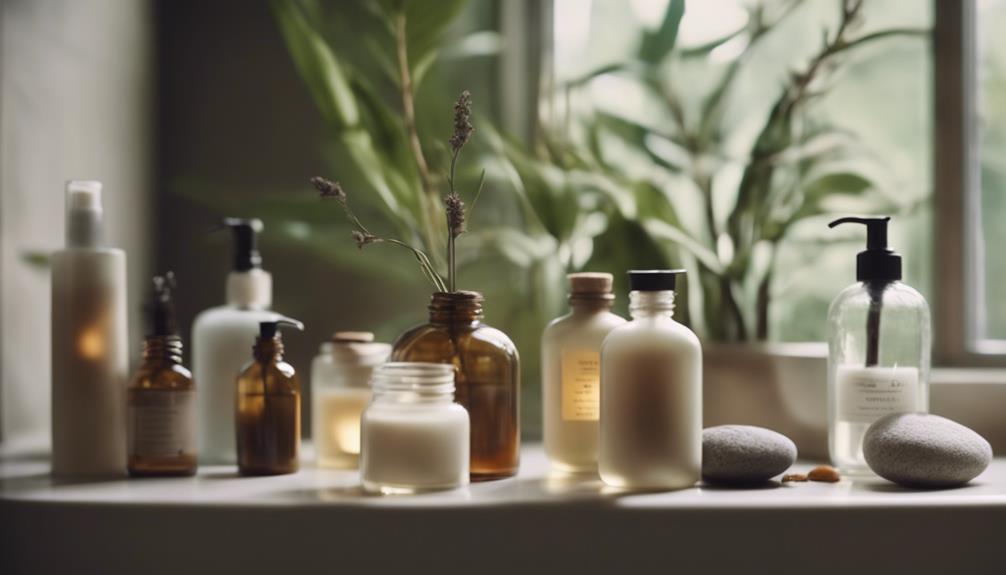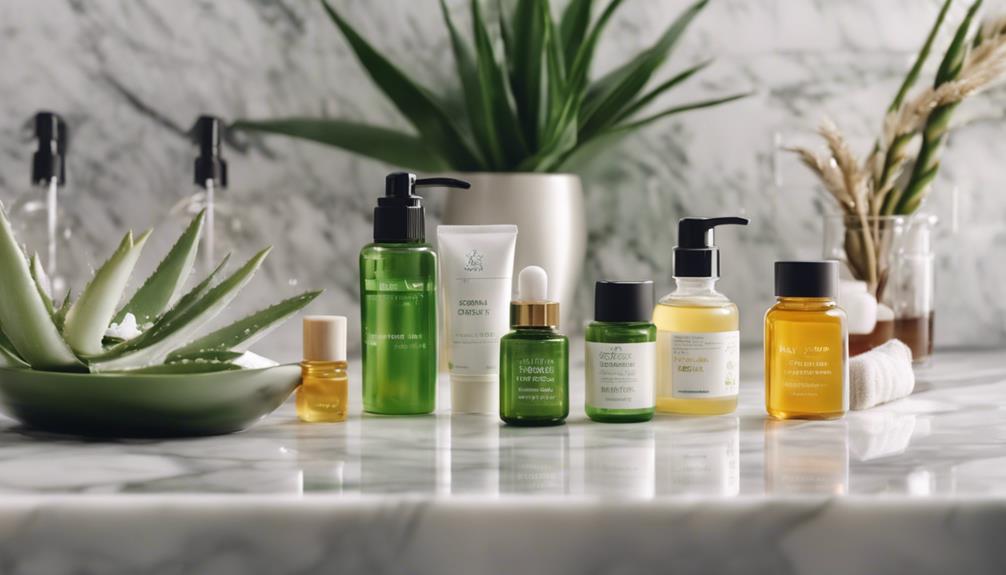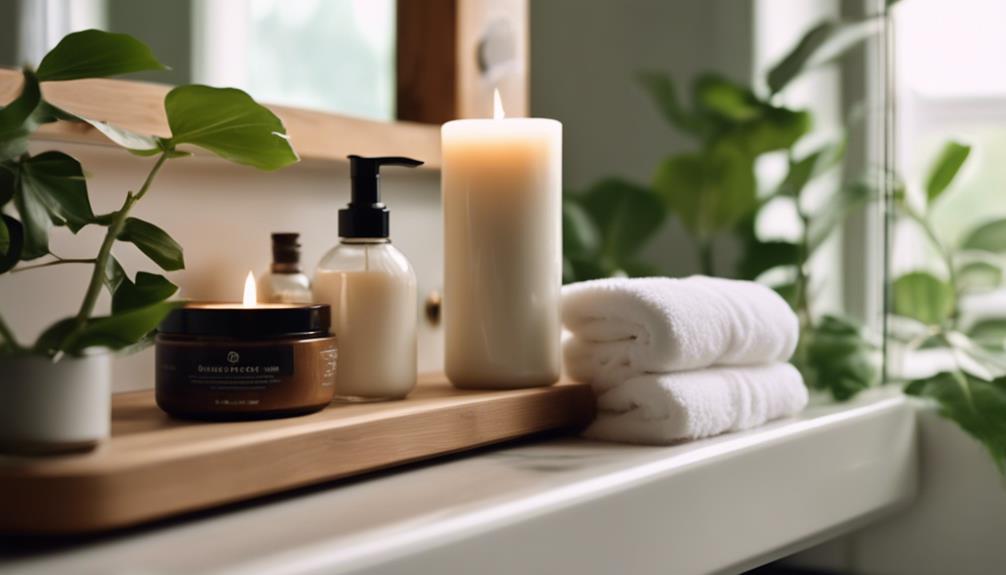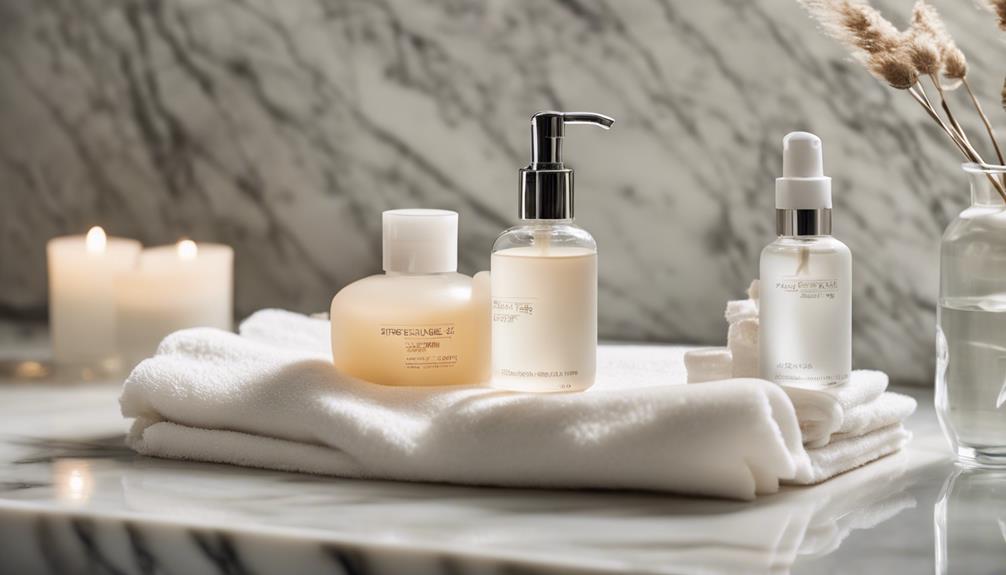In order to achieve radiant, healthy skin, it is important to stick to a regular skincare routine. Begin by using a gentle cleanser to eliminate impurities, then apply a Vitamin C serum for luminosity and protection. Select a moisturizer that works well with your skin type to retain moisture. Remember to always wear sunscreen; a broad-spectrum SPF of 30 or higher is crucial. Regular exfoliation is essential for optimal product penetration. Additionally, stay hydrated by drinking plenty of water and maintaining a balanced diet. For more customized advice and knowledge to enhance your regimen, continue to explore!
Key Takeaways
- Start with a gentle cleanser to remove impurities without stripping natural oils from your skin.
- Apply a Vitamin C serum for brightening complexion and protection against environmental stressors.
- Use a tailored moisturizer to lock in hydration and maintain your skin barrier.
- Never skip broad-spectrum sunscreen with SPF 30 or higher for effective UV protection.
Daily Skincare Essentials
To achieve healthy skin, you need a daily skincare routine that includes a gentle cleanser, moisturizer, and broad-spectrum sunscreen with at least SPF 30.
Start your day by cleansing your face with a gentle cleanser that suits your skin type. This helps remove impurities without stripping your skin's natural oils. After cleansing, apply a Vitamin C serum to brighten your complexion and protect against environmental stressors.
Next, don't forget to hydrate. Choose a moisturizer that's tailored to your skin type, and apply it immediately after cleansing to lock in moisture and maintain your skin barrier. Hydration is key to achieving that plump, healthy look.
Incorporate weekly exfoliation into your routine to remove dead skin cells and improve texture. You can use chemical exfoliants like glycolic acid 2-3 times a week for ideal results. This not only refreshes your skin but also enhances the absorption of other products.
Importance of Sun Protection

Protecting your skin from UV damage is just as essential as hydrating and nourishing it in your daily routine. Daily application of broad-spectrum sunscreen with an SPF 30 or higher is vital to shield your skin from harmful sun exposure. These UV rays not only contribute to skin aging but also considerably increase your risk of skin cancer.
To maximize protection, remember to reapply sunscreen every two hours, or immediately after swimming or sweating. This guarantees that your skin remains safeguarded throughout the day. Additionally, seeking shade during peak sun hours—between 10 AM and 4 PM—can greatly reduce your exposure to intense sunlight.
Wearing protective clothing, wide-brimmed hats, and sunglasses is another effective way to protect your skin from UV rays. These measures help minimize the risk of sun damage and maintain your skin's health over time.
Tailoring Products to Skin Type

Understanding your skin type is the first step in creating an effective skincare routine.
By choosing products that match your specific needs, you can avoid irritation and achieve better results.
Don't forget to adjust your routine as the seasons change or as your skin's needs evolve over time.
Identifying Your Skin Type
Identifying your skin type helps you pick the right products for your unique needs. There are five main types: oily, dry, normal, combination, and sensitive skin.
If you have oily skin, you might notice excess shine and enlarged pores, so it's essential to choose oil-free products that won't clog your pores.
For dry skin, which often feels tight or flaky, look for hydrating ingredients like hyaluronic acid and richer moisturizers to restore moisture.
Normal skin is balanced, allowing you to enjoy a wider range of products, including lightweight moisturizers that keep your skin healthy.
If you have combination skin, you'll likely experience both oily and dry areas, requiring a tailored approach to product selection that addresses each zone effectively.
Sensitive skin can react to many products, so it's best to opt for gentle formulations that are free from harsh ingredients and fragrances to avoid irritation.
Choosing Suitable Products
Selecting the right products for your skincare routine depends on your specific skin type, guaranteeing you address its unique needs effectively.
Start by identifying whether your skin is oily, dry, normal, combination, or sensitive. For oily skin, especially with an oily T-zone, focus on choosing suitable products like non-comedogenic moisturizers and lightweight gels to prevent breakouts and control excess oil.
If you have dry skin, opt for rich, hydrating moisturizers containing hyaluronic acid and ceramides to enhance moisture retention and strengthen your skin barrier.
Normal skin types benefit from a balanced routine, so look for creams or lotions that maintain hydration and overall skin health. Don't forget to address any particular skin concerns you may have. Incorporating facial massage into your routine can also boost collagen production, helping your skin appear firmer and more youthful.
As you continue your skincare journey, regularly reassess your skin type and product effectiveness. Environmental factors, hormonal changes, and aging can alter your skin's needs over time, so staying attuned to these shifts guarantees your routine remains effective.
Adjusting for Seasonal Changes
As the seasons shift, your skincare routine should adapt to meet the changing needs of your skin. This is especially important as varying weather conditions can impact hydration levels and oil production. Tailoring your skin care products can help maintain glowing skin throughout the year.
Here are four essential adjustments to contemplate:
- Moisturizers: In winter, opt for richer moisturizers to combat dryness. In summer, switch to lighter, oil-free formulations to keep your skin fresh.
- Cleansers: Use gentle cleansers during colder months to avoid stripping moisture, while gel-based cleansers can work well in warmer weather.
- Exfoliation: Reassess your exfoliation frequency; your skin may become more sensitive in winter, so reduce the intensity to prevent irritation.
- Sunscreen: Always use SPF 30 (or higher), even in winter. Choose a broad-spectrum formula with added hydration to protect against UV rays and prevent moisture loss.
Key Ingredients for Healthy Skin

When it comes to achieving healthy skin, knowing the key active ingredients is vital.
You'll want to prioritize hydration with ingredients like hyaluronic acid while also incorporating antioxidants and retinol for overall skin health.
Understanding these essentials can make a significant difference in your skincare routine.
Essential Active Ingredients
Incorporating essential active ingredients into your skincare routine can transform your complexion and address various skin concerns effectively. Here are four key ingredients to take into account for achieving healthy skin and a glowing complexion:
- Vitamin C: This powerful antioxidant brightens your skin, evens out your skin tone, and protects against environmental damage, making it vital for a radiant appearance.
- Hyaluronic Acid: Known for its moisture-retaining capabilities, this ingredient can hold up to 1,000 times its weight in water. It helps plump and hydrate your skin, giving you a youthful glow.
- Retinol: A derivative of Vitamin A, retinol promotes cell turnover and stimulates collagen production. It effectively reduces the appearance of fine lines, wrinkles, and uneven skin texture.
- Niacinamide: Also known as Vitamin B3, niacinamide improves your skin barrier function, minimizes pores, and enhances overall skin texture while providing anti-inflammatory benefits.
Incorporating these active ingredients into your routine, along with other skincare tips, will help you achieve the healthy skin and glowing complexion you desire.
Don't forget to patch-test new products to confirm they work well for you!
Importance of Hydration
Hydration plays an essential role in maintaining healthy skin, ensuring it remains plump, elastic, and radiant. To achieve this, make it a habit to drink at least 2 liters of water daily. Staying properly hydrated prevents dryness and supports overall skin function, leading to a healthier appearance.
Incorporate hydrating ingredients like hyaluronic acid into your skincare routine. This powerful ingredient enhances moisture retention, giving your skin a radiant glow. Regular use of moisturizers tailored to your skin type is vital for locking in hydration and protecting your skin barrier from environmental aggressors.
Don't underestimate the impact of a balanced diet, either. Consuming plenty of fruits and vegetables not only hydrates your body but also provides essential vitamins and antioxidants that promote glowing skin.
Nighttime Routine for Repair

To guarantee your skin repairs effectively overnight, start your nighttime routine with double cleansing to remove makeup and impurities. This sets the stage for ideal skin repair. Follow these steps for a glowing complexion:
- Double Cleansing: Use an oil-based cleanser first to dissolve makeup and sunscreen, then follow with a gentle foaming or hydrating cleanser to make certain all impurities are eliminated.
- Retinol Application: Incorporate a retinol serum after cleansing. This promotes cell turnover and boosts collagen production, helping to reduce wrinkles and improve skin texture.
- Hydration Focus: Apply a rich moisturizer or hydrating cream that contains hyaluronic acid and ceramides. This locks in moisture and supports your skin's barrier function.
- Night Masks: Use overnight masks or treatments infused with antioxidants or peptides. They provide deep nourishment and target specific concerns, such as dullness or fine lines.
Maintaining a consistent routine is essential. Aim to complete your regimen at least 30 minutes before bed to allow your products to absorb properly, maximizing skin repair while you sleep.
Lifestyle Factors Influencing Skin Health

Lifestyle factors play a considerable role in determining your skin's health, impacting everything from hydration levels to the appearance of fine lines and blemishes.
Staying hydrated is essential, so aim for at least 2 liters of water daily to keep your skin moisturized and promote a radiant complexion. A balanced diet rich in fruits, vegetables, and healthy fats, like omega-3s from fish, can also enhance skin health and support that youthful glow you desire.
Incorporating regular exercise into your routine boosts circulation, delivering essential nutrients to your skin while reducing stress levels that can trigger issues like acne.
Make sure you're getting sufficient sleep—7 to 9 hours a night is ideal—as it's crucial for skin repair and rejuvenation, preventing dullness and maintaining overall vitality.
Lastly, effective stress management techniques, such as yoga or meditation, can greatly contribute to healthier skin.
Can the Patrick Bateman Skincare Routine be adapted for a more practical and achievable skincare routine for glowing and healthy skin?
The Patrick Bateman skincare routine is undeniably luxurious, but can it be adapted for a more achievable routine? To achieve glowing and healthy skin, consider simplifying the routine with gentle cleansers, moisturizers, and SPF. Incorporating these practical luxurious skincare routine tips can still give you amazing results.
Conclusion
To achieve glowing, healthy skin, stick to your daily essentials, never skip sun protection, and tailor your products to your unique skin type.
Keep an eye out for key ingredients that nourish your skin and don't underestimate the power of a solid nighttime routine for repair.
Plus, remember to factor in lifestyle choices, like diet and hydration.
You've got this—your skin will be as radiant as a vintage Hollywood starlet in no time!









